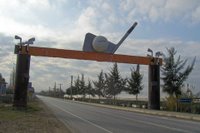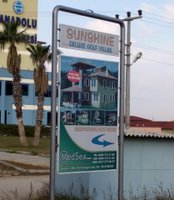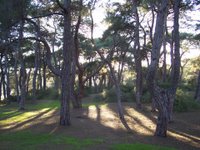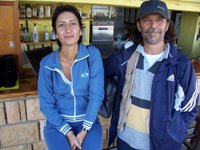One of the world's fast-growing golf areas is Turkey's Mediterranean coast. Nine courses cluster in the Belek area with its Greek ruins, topsy-turvy resort hotel expansion, and the gorgeous backdrop of the crystal blue sea, arid desert, and the snow-capped Taurus mountains. This has always been an area of abrupt changes with its coexisting and clashing cultures -- the Greeks, the Romans, the early Christian byzantines, the Muslim Ottomans, and the modernizing nationalist Turkey of today. But the new golf tourist boom may be the biggest revolution yet with hotels, roads, and golf courses transforming the area's ecology and society. Now you can visit the breathtaking ancient ruins of the Temple of Apollo or, just down the coast, the new Temple of Faldo, the famous British champion's multimillion dollar Cornelia Golf Course winding its lush green way through the sea pines. As it always does, golf links into social and political controversies here. Turkey's Mediterranean global golf tourism revolution has both its unconditional business boosters and vigorous activist opponents.
 Golf Gateway, Kadriye
Golf Gateway, KadriyeA personable young British pro, Ryan Parfett, runs an instructional center in Kadriye with the latest computer simulation equipment. Expatriate golf enthusiasts Michael and Loy de la Pena have formed the Kadriye Belek Golf Society.
 Letoonia Golf Resort, Belek
Letoonia Golf Resort, BelekA decade ago, this part of Turkey's Mediterranean coast was mostly village farmland. Now it has wall-to-wall resort hotels like Letoonia. These Turkish riviera resort enclaves cater mostly to northern European tourists; they offer all-inclusive packages as a cheaper alternative than Spain and Italy to sun-seeking vacationers. The resorts themselves are fenced off from the rest of Turkey with cable tv, elaborate tropical-style swimming pools, and English and European-language speaking staff. Many visitors never leave the grounds during their Turkish stay.
 Ad for golf villas, Belek
Ad for golf villas, BelekRetirees, mostly northern European snowbirds fleeing the winter cold, have been moving to the Turkish riviera. Recent changes to Turkish law make it legal now for foreigners to buy property.

Ali Şahin, Golf Director, Cornelia Faldo Golf Course
That most tourists come from Britain, Germany, and Sweden means that golf investors on the Turkish riviera have sought out European golf stars to "brand" their courses. Faldo's Cornelia course, Turkey's best, opened this year. A Colin Montgomerie "signature" course will be completed nearby in 2007.
 Construction for a new Belek course
Construction for a new Belek courseThe unchecked pace of golf course and resort expansion has raised concerns. There are environmental questions about golf's appropiateness in this arid area with limited water and delicate Mediterranean ecology. No real zoning controls have limited the massive resort hotel development. Although construction and resort workers make Turkish minimum wage with basic benefits, a huge gap also exists between the working-class, mostly Muslim local workers and and the well-heeled vacationing Europeans who have made Turkey's Mediterranean into such a popular destination. That ugly barbed wire fences with guard box entries surround area golf courses heightens the controlled enclave feeling of the new tourist economy.
 Sorgun Forest
Sorgun ForestThis last surviving patch of seaside old growth forest has become a controversial flashpoint. When plans were announced to build a golf course in the forest, locals mobilized a vigorous, hard-fought campaign to stop the project. Their coalition included restaurant and cafe owners in the nearby town of Side, expatriate environmentalists, and both Turkish and international organizations. The Side activists forced cancellation of the proposed course thus saving this lovely forest long a local favorite for birdwatchers, horseback riders, Sunday picnikers.

Zeynep and Mehmet Gülcü
This Side couple helped to spearhead the successful campaign to save the Sorgun forest from golf course development. They run the popular Mehmet's Bar with its lovely Mediterranean view in the small tourist town of Side. Another local activist, Harun Friese, runs the wonderful Apollonik Cafe right on Side's harbor next to the Temple of Apollo.
 Silence Beach Hotel, Side
Silence Beach Hotel, SideEnvironmentalists could not block this cookie-cutter resort hotel at the Sorgun forest's edge. In the foreground is the last small public beach in this area that has seen the privatization of most coastline for tourist resorts.

Temple of Apollo, Side
Labels: Belek, golf, Nick Faldo, Sorgun, Turkey


1 Comments:
The Golf Course may have gone by the way. I am not 100% sure it would be a bad thing as it would save the forest from the unscrupulous property developers/arsonists who are accused of burning down other forests. vis: Massive Fire in Manavgat only 2-3 kms away.
The Sueno Beach Hotel is an eyesore and a desperate kick in teeth to those who fought to preserve the sanctity of the forest. Every night the Luna Park with it's garish array of flourescent lights making it look like the Big Wheel is flashing some rude message to the folk on the East beach.
I doubt the Golf would frighten off the Turtles who arrived at the beach since time immemorial.
Tourist development has a lot to answer for.
I hope the forest survives the heat wave that is being experienced in the area.
Maybe someone could start a campaigh to snuff out the Fun Fair for a start. It, like the new Hotel Sueno, does nothing whatsoever for the beach of for Side! It vacuum cleans up tourists like some sort of vampiric magnet and with its 'all-inclusive' policy stops them spending money in the town.
All Side gets from the all-inclusive Sueno is its dirty water to deal with.
Personally I am not sure now if the Golf Course may have preserved more of old Side, and the Sorgun Forest, than the Sueno will ever do.
Post a Comment
<< Home